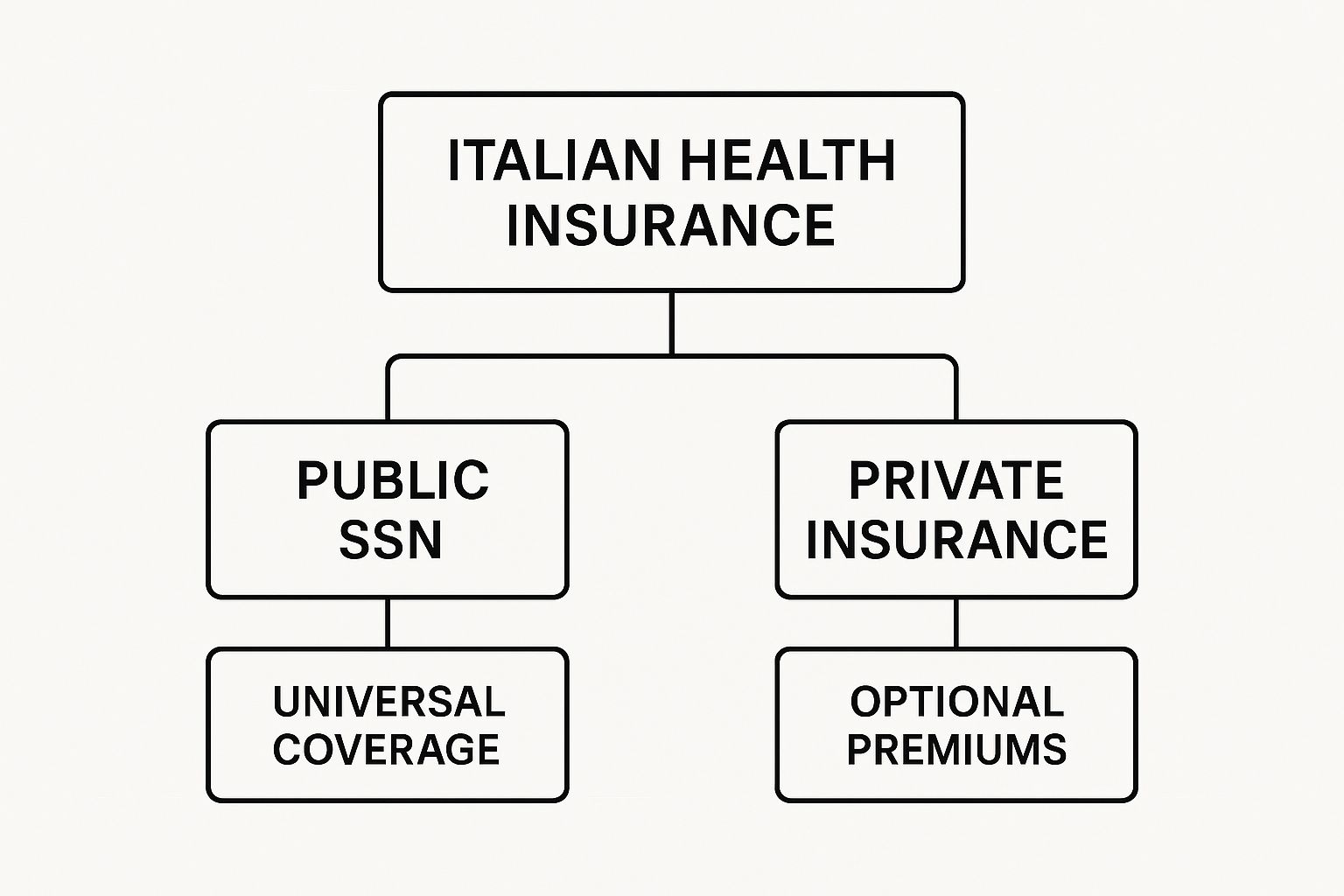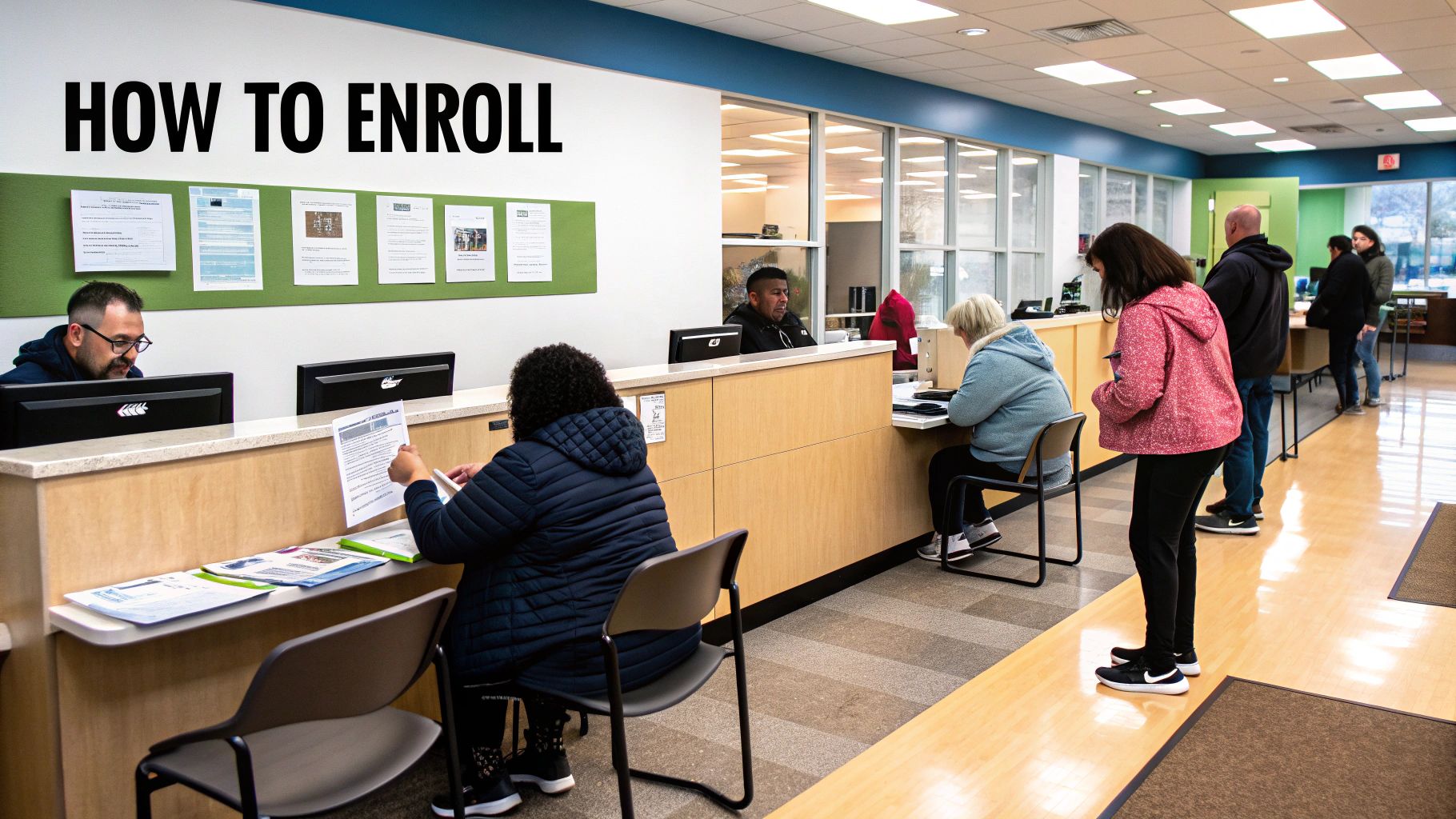For discerning individuals relocating to Italy, mastering its healthcare system is a paramount concern. Italy operates on a highly-regarded dual system, blending universal public care with a responsive private sector. This sophisticated structure provides both a robust safety net and the option for premium, personalized medical services tailored to your standards.
Understanding Italy's Dual Healthcare System
Health insurance in Italy can be conceptualized as two parallel systems. The first is the state-funded public system, the Servizio Sanitario Nazionale (SSN), which offers universal coverage to all legal residents. The second is a vibrant private sector, providing expedited access and superior amenities for those who require a higher echelon of service.
For most sophisticated expatriates, the optimal strategy is not to choose one over the other but to layer private insurance on top of the public system. This creates a comprehensive healthcare portfolio that leverages the strengths of both worlds, affording you unparalleled flexibility and complete peace of mind.
The Foundation: The Servizio Sanitario Nazionale (SSN)
The SSN is the cornerstone of Italian healthcare and is consistently ranked among the world's best for both quality and accessibility. The system is predicated on the principle that all legal residents are entitled to care, regardless of income, and is primarily funded through corporate and income taxes.
The public system's scale is substantial. The Servizio Sanitario Nazionale (SSN) accounts for a significant majority of the revenue share in Italy's health insurance market. It guarantees essential services, including hospital stays, general practitioner consultations, and specialist visits for all residents. Italy's commitment to healthcare is demonstrated by its national spending, which consistently exceeds 9% of its GDP—a figure that surpasses many other developed nations. You can delve deeper into the data in this market report on Italian health insurance.
This diagram provides a clear illustration of how the two systems are structured.

As depicted, the landscape is defined by two primary avenues: the universally accessible public SSN and the elective, premium-based private insurance sector.
To provide a clearer side-by-side analysis, here is a concise overview of what each system offers.
Italian Healthcare At a Glance
| Feature | Public System (SSN) | Private System |
|---|---|---|
| Coverage | Universal for all legal residents | Elective; purchased by individuals or employers |
| Cost | Funded by taxes; low or no-cost at point of service | Paid via monthly/annual premiums and deductibles |
| Access to Specialists | Requires referral from a GP; may involve significant wait times | Direct access; substantially shorter wait times |
| Choice of Doctor/Hospital | Limited; generally assigned based on location | Complete freedom to choose doctors and facilities |
| Hospital Stays | Shared rooms are standard | Private rooms and superior amenities |
| Core Strengths | Comprehensive, low-cost essential and emergency care | Speed, comfort, choice, and access to specialized services |
This table illustrates how the two systems are designed to cater to different requirements—one providing a universal foundation, the other offering a layer of choice, discretion, and convenience.
The Alternative: Private Health Insurance
In parallel with the SSN, Italy possesses a robust private healthcare market. This system is composed of private hospitals, specialized clinics, and independent medical professionals. It is the preferred choice for individuals who place a premium on convenience, comfort, and direct control over their medical care.
A private policy is the key that unlocks a more exclusive healthcare experience. It allows you to bypass public system waiting lists, select your own specialists, and access facilities with hotel-like amenities and multilingual staff.
Opting for private insurance delivers clear strategic advantages:
- Expedited Access: Experience dramatically shorter waiting times for specialist appointments, diagnostic tests, and elective surgeries.
- Unrestricted Choice: Enjoy the freedom to select your preferred doctors, surgeons, and hospitals from an extensive network.
- Enhanced Comfort: Gain access to private rooms and premium facilities that ensure a more comfortable and restorative patient experience.
- Specialized Care: Secure coverage for services often limited or excluded by the public system, such as certain advanced dental procedures or alternative therapies.
Securing Access to the Servizio Sanitario Nazionale

Once your residency in Italy is established, the next critical step is enrolling in the public healthcare system, the Servizio Sanitario Nazionale (SSN). This is more than a mere administrative task; it is your formal entry into one of the world's most respected public health infrastructures. Enrollment grants access to a vast network of medical services, from a local family doctor to specialized hospital care.
The enrollment process is not uniform. Your path is determined by your citizenship and residency status, and it is vital to understand the distinction between mandatory and voluntary enrollment. For most legal residents, particularly those employed in Italy, registration is a requirement, ensuring seamless integration into the system.
How Expatriates Qualify for the SSN
Your legal status in Italy dictates your specific route to SSN enrollment. The system has clearly defined pathways for both EU and non-EU citizens.
For EU citizens planning a stay exceeding three months, the process is straightforward. Upon registering your residency (iscrizione anagrafica) at your local town hall (comune), you become eligible for SSN access on par with any Italian citizen.
For non-EU citizens, eligibility is contingent upon your residency permit, the permesso di soggiorno. If your permit is for employment, family reasons, or long-term residency, you are legally obligated to register with the SSN. This is a fundamental component of establishing your life in Italy, funded through your social security contributions.
Certain visa categories, such as the Elective Residency Visa, initially require private health insurance. However, once residency is established, you may opt for voluntary enrollment in the SSN by paying a calculated annual contribution.
The crucial distinction lies in entitlement. Mandatory registration is a right linked to specific residency permits. Voluntary registration is an option available to other legal residents, who pay an annual fee to access the same comprehensive system.
Choosing between a private policy and voluntary SSN enrollment is a strategic decision. A private plan offers immediate, premium coverage upon arrival, while the SSN provides deep, comprehensive, long-term care once you are officially a resident.
The Registration Steps and Required Documentation
The administrative center for all SSN registrations is your local health authority, the Azienda Sanitaria Locale (ASL). You must visit your designated ASL office to complete the process. The outcome is your personal health card, the Tessera Sanitaria.
This card is your key to the system. It functions as your proof of insurance, your Italian tax code card (codice fiscale), and for EU citizens, it also serves as a European Health Insurance Card (EHIC) on the reverse side. It is the instrument that unlocks all public healthcare services.
To ensure a seamless process, meticulous preparation is essential. Arriving with the correct documentation will prevent unnecessary delays and return visits.
Your Essential Document Checklist for SSN Enrollment:
- A valid passport — your primary photo identification.
- Permesso di Soggiorno (or the application receipt) — for non-EU citizens, this is the most critical document. The official receipt (ricevuta) from your application is typically sufficient to initiate the process while you await the physical card.
- Codice Fiscale — your unique Italian tax identification number, required for nearly all official transactions in Italy.
- Certificate of Residence (certificato di residenza) — an official document from your comune confirming your address.
- Self-Declaration of Income — for voluntary registration, you must declare your income to determine your annual contribution.
Upon successful registration, you will select a primary care physician (medico di base) from an approved list in your area. This doctor becomes your first point of contact for non-urgent matters, managing referrals to specialists and overseeing your general health within the SSN framework.
The Strategic Value of Private Health Insurance

While Italy's public healthcare system, the Servizio Sanitario Nazionale (SSN), provides a remarkable foundation of care, it is not immune to operational pressures. For discerning individuals accustomed to efficiency and a superior level of service, private health insurance is not a luxury; it is a strategic asset.
The intelligent approach is to utilize the public system's strengths for major emergencies while leveraging private coverage for virtually all other medical needs. This strategy builds a healthcare plan that places you in command, guaranteeing prompt, high-quality care on your own terms.
Bypassing Public System Delays
Frankly, the most compelling rationale for securing private health insurance in Italy is to circumvent wait times. While the SSN excels in managing emergencies, obtaining non-urgent specialist appointments or elective procedures can involve considerable delays. These are not systemic flaws but the logistical reality of a system serving an entire population.
A private plan functions as your express pass. Instead of waiting months for a critical MRI or a consultation with a leading specialist, you can often be seen within days. This is not merely a matter of convenience—it is about achieving a timely diagnosis and initiating treatment promptly, which can have a profound impact on health outcomes. It fundamentally shifts your healthcare posture from reactive to proactive.
The Financial Realities of Italian Healthcare
The SSN, despite its strengths, operates under significant financial strain. The rising costs of medical technology, an aging demographic, and the increasing prevalence of chronic diseases have stretched public budgets. Consequently, long waiting lists are a persistent issue.
This has fostered a culture where out-of-pocket payments for faster private care are common. This direct private expenditure has grown to approximately €37 billion annually, constituting a substantial portion of Italy's total health expenditure.
A robust private policy insulates you from these direct costs, offering financial predictability and safeguarding your assets.
Private health insurance is an investment in immediacy and choice. It transforms your healthcare experience from one of waiting and uncertainty to one of command and certainty, providing access to the care you need, precisely when you need it.
Access to Premier Facilities and Unrivaled Comfort
Private health insurance opens the door to Italy’s most exclusive private hospitals and clinics. These institutions are often designed to resemble boutique hotels rather than traditional medical centers, cultivating an environment conducive to rest and recovery.
The distinction is significant. You can expect:
- Private Accommodations: A private room with an en-suite bathroom is the standard, affording you the tranquility necessary for recuperation.
- Superior Amenities: Expect elevated dining options, multilingual concierge staff, and more flexible visiting hours for family and associates.
- Cutting-Edge Technology: Private facilities compete to offer the latest diagnostic and surgical equipment, ensuring access to the best medical technology available.
This level of comfort and service minimizes the stress of medical treatment, allowing you to focus entirely on your recovery.
Gaining Complete Freedom of Choice
A cornerstone of private health insurance is the absolute freedom to choose your medical provider. Within the public SSN, your choice of doctors and surgeons is often constrained by your geographical location and the official referral process.
Private coverage removes these limitations.
You gain the liberty to select from Italy's most respected specialists and surgeons, regardless of whether they operate within the public or private system. This allows you to assemble your own "dream team" of trusted medical experts. Making an informed choice is critical, and understanding the different policy types is the first step. For further analysis, consider reviewing our guide on how to choose the right expat health insurance policy.
This autonomy ensures your care aligns perfectly with your personal preferences and exacting medical standards.
How to Select Your Ideal Private Insurance Plan

Selecting the right private health insurance in Italy is a critical decision that underpins your health and financial security. A successful choice requires looking beyond marketing materials to identify a plan that is truly congruent with your lifestyle and expectations.
The first and most fundamental decision is between two distinct provider types: local Italian insurers and global international carriers. Each is engineered for a different profile of expatriate.
Domestic vs. International: A Strategic Choice
Local Italian insurers offer policies specifically designed to supplement the public SSN. They excel at providing targeted benefits, such as dental coverage or access to a network of private clinics within Italy, often at a more accessible price point.
International providers, however, operate on a global scale. Their plans are architected for the international citizen, offering seamless, high-level coverage not only in Italy but across Europe and, frequently, worldwide. If you travel often for business or leisure—or if you anticipate future relocations—this international portability is not a mere feature; it is an essential requirement.
The choice is analogous to selecting a fine automobile. A local Italian plan is a superb city car—perfect for navigating daily life within Italy. An international plan is a grand tourer, engineered to cross borders effortlessly, delivering the same high performance whether you are in Rome, London, or Singapore.
This distinction is paramount. A top-tier international policy ensures your quality of care remains consistently high, regardless of your location. It eliminates the stress and uncertainty of navigating foreign healthcare systems during a medical event, providing a single, reliable partner for your health needs worldwide.
Your Essential Policy Checklist
When comparing plans, a detailed checklist is indispensable. It compels you to scrutinize the fine print and compare policies on substance, not merely on price. Focus on these core elements to discern the true value of each offering.
A methodical review at this stage can prevent significant financial and medical complications later.
Core Coverage Areas to Scrutinize:
- Inpatient and Outpatient Limits: Examine the maximum annual limits for hospital stays (inpatient) and services like specialist consultations or diagnostic scans (outpatient). High limits are essential for true financial protection.
- Geographic Scope of Coverage: Verify whether the plan covers you only in Italy, across Europe, or worldwide. Be crystal clear on this, and note any exclusions, particularly for high-cost jurisdictions like the USA.
- Network of Hospitals and Clinics: Request a list of the provider’s in-network facilities. Confirm that the premier private hospitals in your area—and any other cities you frequent—are included.
- Direct Billing Arrangements: Inquire if the insurer offers direct billing (pagamento diretto). This is a critical feature. It means the hospital invoices the insurer directly, so you are not required to settle a substantial bill upfront and seek reimbursement later.
Advanced Features for Discerning Clients
Beyond the fundamentals, certain advanced features distinguish a standard policy from a truly premier one. These are the benefits that deliver the greatest value and convenience, particularly in adverse circumstances.
Pay close attention to how a policy addresses emergencies and pre-existing conditions, as these are areas where inadequate coverage can become a serious liability.
- Emergency Medical Evacuation and Repatriation: For any international traveler, this is non-negotiable. It covers the formidable costs of transporting you to the nearest center of medical excellence or back to your home country if medically required.
- Pre-existing Conditions Coverage: This is arguably the most critical variable. Full transparency regarding your medical history is imperative. Select premium international plans will cover pre-existing conditions, though this may be subject to a waiting period or a higher premium.
- Wellness and Preventative Care: The best plans do more than provide care when you are ill; they help you maintain optimal health. Look for benefits that cover annual health assessments, cancer screenings, and other preventative services.
For individuals requiring comprehensive, borderless protection, a thorough understanding of these policy details is vital. You can delve deeper by exploring our detailed guide on international private medical insurance, which deconstructs all key considerations for expatriates. Making the right choice here is the foundation of a secure and successful life abroad.
Getting Your Health Insurance Sorted, Step by Step
You are now prepared to engage with the Italian healthcare system. While narratives of Italian bureaucracy can seem daunting, securing your health insurance is a logical, manageable process. It is best viewed not as a maze, but as a sequence of gateways to be unlocked in the correct order.
The first and most important principle is this: your healthcare journey begins not at a medical facility or an insurer's office, but with the formalization of your legal residency. Your residency documents are the non-negotiable keys to both the public and private health systems. Without them, you cannot proceed.
Step 1: Laying the Paperwork Foundation
Before considering the Azienda Sanitaria Locale (ASL) or private insurance policies, you must secure your core Italian documentation. This is analogous to laying the foundation of a house; without a solid base, any subsequent structure is compromised. These documents provide legal proof of your presence in the country.
Your immediate objective is to procure these three essentials:
- Permesso di Soggiorno (Residency Permit): For all non-EU citizens, this is the pivotal document. You must apply for it within eight working days of your arrival in Italy. A crucial tip: the application receipt (ricevuta) is often sufficient to initiate your health insurance registration.
- Codice Fiscale (Tax Code): This is your unique Italian tax ID. It is required for nearly every official transaction in Italy, including healthcare registration and insurance contracts.
- Proof of Accommodation: This typically takes the form of a registered rental contract (contratto di affitto) or property deed, which is necessary to establish your official residency (residenza).
Organize these documents with precision. Having them readily available will prevent countless frustrations and delays.
Step 2: Choosing Your Coverage Path
With your foundational paperwork secured, you arrive at a strategic decision point. Your path forward will depend on your chosen coverage: enrolling in the public SSN, activating a private plan, or—as is common for discerning expatriates—implementing a hybrid strategy of both.
Path A: Registering with the Public SSN
To enroll in the Servizio Sanitario Nazionale, your destination is the local health authority, the Azienda Sanitaria Locale (ASL). You will present your documentation, and upon verification, you will be registered and issued your Tessera Sanitaria (Italian Health Card). This card is your official key to the public system.
The ASL registration is the crucial step that officially integrates you into the state system. It enables you to select your family doctor (medico di base) and access the full spectrum of public health services, providing a vital and robust safety net.
Path B: Finalizing Your Private Policy
If you are proceeding with private insurance, this process occurs in parallel. You will liaise with an insurance broker or the provider directly. They will also require copies of your passport, codice fiscale, and proof of address to issue your policy.
A critical final step that is often overlooked is activation. Simply signing the contract and remitting payment is insufficient. You must follow up to confirm with the provider that your policy is officially active. Secure your insurance card and policy documents. Ensure you understand the direct billing (pagamento diretto) procedure and have a list of in-network hospitals and specialists. This proactive step ensures that when you require your premium insurance, you will experience no administrative friction.
Navigating Italian Healthcare Frequently Asked Questions
When contemplating a move to Italy, health insurance invariably emerges as a primary consideration. The system may appear complex, but it can be navigated with clarity. Here, we address the most common questions we receive, providing direct, concise answers.
Is Private Health Insurance Mandatory in Italy?
No, it is not mandatory for legal residents who are properly enrolled in the public system, the Servizio Sanitario Nazionale (SSN). Once you are registered with the SSN, you have fulfilled Italy's healthcare requirements.
However, there is a critical exception: certain long-stay visas, notably the Elective Residency Visa, require proof of comprehensive private health insurance as a prerequisite for the application. You must secure this private plan to obtain the visa and maintain it for at least your first year, or until you have successfully enrolled in the SSN. Many high-net-worth individuals elect to maintain their private policy indefinitely for the superior convenience and immediate access it affords.
A key distinction to understand: The SSN serves as a foundational safety net. Upon enrollment, it covers all pre-existing conditions without waiting periods. Private insurance, conversely, will conduct a thorough underwriting of your medical history. Insurers may impose waiting periods, charge higher premiums, or exclude coverage for pre-existing conditions based on their internal risk assessments.
Can I Use My International Insurance Plan?
Yes, absolutely. Private hospitals and clinics throughout Italy are well-versed in and widely accept international health insurance plans. The key is to be intimately familiar with the specifics of your policy before you need to utilize it.
First, confirm that your plan includes a robust network of hospitals and physicians in Italy, particularly in your intended region of residence. Equally important is to understand the billing protocol. The premier plans offer direct billing, whereby the insurance company settles the invoice directly with the hospital. Without this feature, you could be liable for substantial medical bills upfront, which you would then need to reclaim from your insurer.
For more answers to common questions, our guide on frequently asked questions about expat life covers a wide range of related topics.
What Is the Approximate Annual Cost?
The cost of private health insurance in Italy varies significantly, predicated on your age, desired level of coverage, and choice of insurer. It can be understood in two primary tiers.
- Supplemental Plans: For a basic policy designed to complement your SSN coverage—perhaps for co-payments or specific services—annual premiums typically range from €1,500 to €3,000.
- Comprehensive Plans: For a premium plan offering extensive benefits, global coverage, and access to elite private facilities, costs generally start around €5,000 and can easily exceed €15,000 annually for an individual.
Ultimately, the cost is commensurate with the level of service and security you require. A plan for simple peace of mind within Italy is a fundamentally different instrument from one designed for global mobility and complete flexibility.
Navigating the complexities of international medical insurance is significantly more efficient with expert guidance. At Riviera Expat, we specialize in sourcing world-class health coverage for discerning professionals and investors. We provide objective, clear advice to ensure your policy is perfectly aligned with your life in Italy and wherever your interests may take you.
Secure your consultation with a Riviera Expat specialist today

